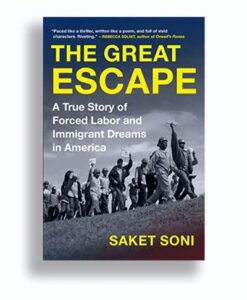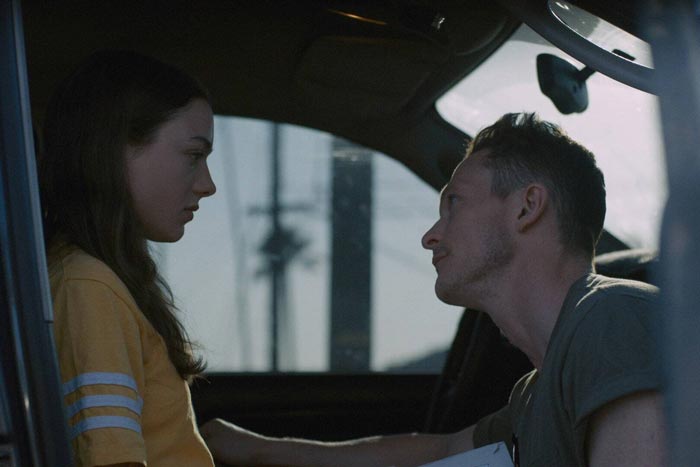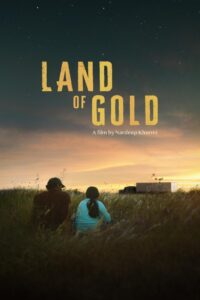Summertime is finally here, and you’ve probably been seeing a lot of bucket lists out there: where to go, what to eat, what to watch, what to do. At the Laboratory to Combat Human Trafficking, we’ve been thinking about a different kind of list…a few of our top recommendations for books, podcasts, and movies that will deepen your understanding of human trafficking and exploitation in today’s America.
Whether you prefer to read, listen, or watch, there’s something for everyone on this list. Check out these important pieces of media to spark new knowledge and consider this critical human rights issue through a new lens.
#1: BOOK: The Great Escape: A True Story of Forced Labor and Immigrant Dreams in America by Saket Soni
 Published in early 2023, The Great Escape documents one of the largest human trafficking schemes in American history — and the workers’ courageous quest for justice. In late 2006, just after Hurricane Katrina, community organizer Saket Soni received an anonymous phone call from an Indian migrant worker in Mississippi.
Published in early 2023, The Great Escape documents one of the largest human trafficking schemes in American history — and the workers’ courageous quest for justice. In late 2006, just after Hurricane Katrina, community organizer Saket Soni received an anonymous phone call from an Indian migrant worker in Mississippi.
That single late-night phone call led to the discovery that 500 Indian workers were lured to the United States with false promises of a green card. They had scraped together $20,000 each for this “opportunity.” Instead, they were forced to work through horrible conditions while rebuilding oil rigs at a shipyard in Mississippi. Surrounded by barbed wire, watched by guards, crammed into freezing cold trailers, fed moldy bread and frozen rice — these migrant workers were the ones rebuilding America post-climate disaster.
This book chronicles Soni’s efforts to organize the Indian workers’ great escape from the camp: “The escape involved a lot of whiskey, cigars, as bribes for the guards, and then an elaborate but fictitious Indian wedding that let us ferry 500 men out of the labor camp into a hotel room, right under the guards’ noses,” says Soni.
We made the case that this was not just garden variety labor abuse or even awful conditions. This was actually forced labor and human trafficking. They were not free to leave, not because they were trapped by a lock and key, but because their debts kept them — even past the point that their visas expired, even when they were undocumented — kept them at work and inside Signal’s labor camps.” — Saket Soni, author of The Great Escape
Soni struggles to have the survivors recognized as victims of human trafficking, which entitles them to a special visa so that they can reunite with their families and eventually apply for green cards. Along the way, Immigration and Customs Enforcement agents tried to deport the men, company officials tried to discredit them, and politicians looked away. This gripping story provides insight into a major labor trafficking scenario in the United States — and the urgent need for more advocacy and solutions. Find the book online or from your local bookstore, or check it out from the library!
#2: MOVIE: Palm Trees and Power Lines
Trigger Warning: Palm Trees and Power Lines contains explicit scenes and sensitive content depicting the sexual exploitation of a minor. It is not suited for all audiences, so please view it with caution and care.
Palm Trees and Power Lines is an important depiction of the manipulation, grooming, and psychological control that traffickers use to exploit victims. A heartbreaking and difficult movie to watch, this story is devastating but important. With its description of grooming of a teenage girl by an older man, it shows the complexities of sexual exploitation — an especially important watch for parents and people who work with youth.
Not yet eighteen, Lea spends her summer break in Southern California tanning, hanging out with friends, and avoiding her mother. After a chance encounter, a man twice her age, Tom, promises a new life filled with excitement. A way out of the summer boredom of suburbia, Lea falls for the magnetic and charming Tom. Over time, red flags about Tom’s life surface; Lea chooses to ignore them as she believes she is falling in love with him. She becomes isolated from her friends and family, just as she discovers Tom’s true intentions.
Summer recommendation to deepen your understanding of human trafficking. Scene from Palm Trees and Power Lines with Lea and Tom

Photo: Momentum Pictures
Director Jamie Dack shared that the screenplay was partly based on her own lived experience and inspired by survivors of human trafficking. “It was super challenging, and the film deals with themes that I think some people were afraid of, unfortunately,” Dack said in a recent interview with IndieWire. Since its release in early 2023, the movie has received several awards.
“One of the most challenging aspects of the movie for me was witnessing the clear portrayal of grooming and manipulation, which was so evident to the viewer but often missed by Lea herself. Importantly, Palm Trees and Power Lines sheds light on experiences that are quite common among trafficked and exploited youth. It also prompts us to reflect on the realities of how adolescent vulnerability can be exploited in our own communities, and urges us to consider what actions we can take to prevent it.” — Craig Nason, Development and Communications Director at LCHT
Watch the movie on Amazon Prime Video
#3: PODCAST EPISODE: “The Child Labor Crisis in America” on NPR’s Fresh Air
You may be aware that over the past year, several exposés (like this one in the New York Times) have documented child labor in the United States. Many of them are migrants from Central America, and they are working some of the most dangerous jobs in America. From construction sites to slaughterhouses to factories, kids as young as 14 work long hours in terrible conditions to support themselves and their families.
Today, some states, including Iowa, Missouri, and Ohio, are considering relaxing child labor laws and rolling back protections. This NPR Fresh Air podcast episode is a conversation between Tonya Moseley and New York Times Pulitzer Prize-winning investigative reporter Hannah Dreier, who has been reporting on migrant child labor, and Washington Post business reporter Jacob Bogage, who has been reporting on campaigns to weaken child labor laws in some states.

Source: Pixabay
Dreier estimates that over the past two years, 250,000 children have entered the United States without their parents, and most are working full-time jobs. “These are jobs working for household brands like Cheerios, Cheetos, Ford,” she says. “These are jobs that used to go to undocumented immigrants. Now they go to undocumented child migrants.” Through her reporting, Dreier has found children working in all 50 states.
“I talk to children who are making Flamin’ Hot Cheetos every night, and they told me their lungs were burning from that spicy dust. They were doing this grueling work night after night.” — Hannah Dreier, New York Times Reporter
The conversation brings to light the lack of support systems for these children and the current migrant crisis our country is facing. If you want to understand this challenge in child migration and how levels of exploitation exist within business and corporate entities — and how few protections exist to prevent these realities — this podcast episode is for you.
#4: MOVIE: Land of Gold
 Land of Gold, which recently was released for streaming on HBO Max, tells the story of two immigrant stories converging — one an unaccompanied minor. Truck driver Kiran, a first generation Punjabi-American, hears pounding from the inside of his trailer. Inside, he discovers Elena, a young Mexican-American girl.
Land of Gold, which recently was released for streaming on HBO Max, tells the story of two immigrant stories converging — one an unaccompanied minor. Truck driver Kiran, a first generation Punjabi-American, hears pounding from the inside of his trailer. Inside, he discovers Elena, a young Mexican-American girl.
Because he thinks Elena might be undocumented, Kiran doesn’t turn her into the police. Instead, he resolves to bring Elena across the country, 3,000 miles from California to her uncle in Maine. About to become a father himself, Kiran and Elena connect through family and dreams of the future, while navigating past trauma, racially charged encounters, and living in fear of immigration authorities throughout their journey. Both share a past of parents who were promised a better life for their children in America, only to feel betrayed by this inherited dream.
Growing up in an immigrant family himself, director Nardeep Khurmi’s film explores what it means to be “other” in today’s America. He drew inspiration for the film from the stories of migrants navigating the system and their new lives in the United States, amidst a culture of fear. Khurmi reminds us that we must consider the root causes that push families from their homes in the first place — poverty, violence, trauma — and the fact that the challenges of navigating one’s legal status, unfamiliar systems, and racism against certain identities once arriving in the U.S. create vulnerable situations that may lead to exploitation.
“I started to see all of these new stories of children separated from their families at the United States-Mexican border, trapped in cages for doing nothing except existing. I wondered what it is to raise a child in this country now with all of these fears… I started to think about how you raise a child in that system and teach them to pursue their dreams knowing there are so many limitations. How terrifying is it to be a parent with that point of view? These were the inklings of how Land of Gold came about.” — Nardeep Khurmi, Director
Tumultuous yet uplifting, this movie documents the convening of two migrant stories — one a child and one on the cusp of fatherhood — as their journey illuminates our shared human need for safety and happiness.
While the recommendations on our list are not necessarily easy and breezy, they tell compelling and engrossing stories that will help shape your understanding of the risks and exploitation for labor and sex that is happening in the United States today.
Check out the recommendations on this list and let us know what you think. And if you have any recommendations you would add to this list, please let us know. We’d love to hear your perspective and grow this list to share with our community.
